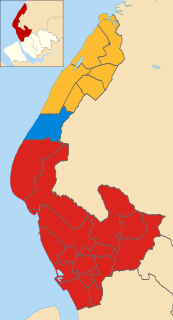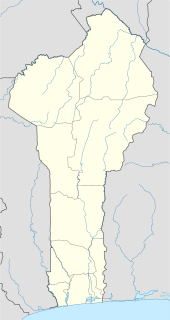
The Democratic Party is a centre-left liberal political party in Hong Kong established in 1994. Chaired by legislator Wu Chi-wai, it is currently the third largest party in the Legislative Council of Hong Kong, having seven seats and 37 District Councillors. It is also the largest pro-democracy party in the legislature.

Darren Paul Johnson is a former English politician and prominent member of the Green Party of England and Wales. He represented the Green Party in the London Assembly from 2000 to 2016 and was a Green councillor in the London Borough of Lewisham.

Elections in Benin take place within the framework of a multi-party democracy and a presidential system. Both the President and the National Assembly are directly elected by voters, with elections organised by the Autonomous National Electoral Commission (CENA).
Elections in Thailand refers to the democratic process in which some parts of the Government of Thailand is selected. These include the House of Representatives of Thailand, the Senate of Thailand, local Administrations, Governorship of Bangkok and national referendums. Thailand has so far had 25 general elections since 1933; the last election was in 2014. Voting in elections in Thailand is compulsory. All elections in Thailand are regulated by the Election Commission of Thailand.

Leeds City Council is the local authority of the City of Leeds in West Yorkshire, England. It is a metropolitan district council, one of five in West Yorkshire and one of 36 in the metropolitan counties of England, and provides the majority of local government services in Leeds. Since 1 April 2014 it has been a constituent council of the West Yorkshire Combined Authority.

The politics of the Highland council area in Scotland are evident in the deliberations and decisions of the Highland Council, in elections to the council, and in elections to the House of Commons of the Parliament of the United Kingdom (Westminster) and the Scottish Parliament (Holyrood). In the European Parliament the area is within the Scotland constituency, which covers all of the 32 council areas of Scotland.

An election to the County Council of London took place on 5 March 1913. It was the ninth triennial election of the whole Council. The size of the council was 118 councillors and 19 aldermen. The councillors were elected for electoral divisions corresponding to the parliamentary constituencies that had been created by the Representation of the People Act 1884. There were 57 dual member constituencies and one four member constituency. The Council was elected by First Past the Post with each elector having two votes in the dual member seats. Unlike for parliamentary elections, women qualified as electors for these elections on exactly the same basis as men. Women were also permitted to stand as candidates for election.
Middlesex County Council was the principal local government body in the administrative county of Middlesex, England from 1889 to 1965.

Legislative elections took place on 10 and 17 June 2012 to select the members of the 14th National Assembly of the French Fifth Republic – a little over a month after the French presidential election run-off held on 6 May.
A general election was held in San Marino on 13 June 1915 to elect the fourth term of the Grand and General Council.

The 2012 Sefton Metropolitan Borough Council election took on 3 May 2012 to elect members of Sefton Metropolitan Borough Council in England, as part of the United Kingdom local elections, 2012. 22 seats, representing one third of the total Council membership, were up for election in single-member wards. Ten - nearly half - of the members elected were newcomers to the Council; five of these defeated sitting Councillors seeking re-election, whilst in the other five wards, the incumbent retired. Two incumbents stood under different labels to those they were elected under in 2008; both were defeated in their wards.
The first election to the Glamorgan County Council were held on 17 January 1889. Results were announced over several days. They were followed by the 1892 election. The authority, by far the largest county in Wales in terms of population, was established by the 1888 Local Government Act. The county of Glamorgan was at this time becoming heavily industrialised although some areas such as the Vale of Glamorgan remained essentially rural.

Administrative Council elections were held in Dahomey for the first time in 1925.

Administrative Council elections were held in Dahomey in 1928.

Administrative Council elections were held in Dahomey in 1932.

Administrative Council elections were held in Dahomey in 1936.

Administrative Council elections were held in Dahomey in 1930.

The 2018 Leeds City Council election took place on 3 May 2018 to elect members of Leeds City Council in England. They were held on the same day as other local elections across England and the rest of the UK.
An election to the County Council of London took place on 7 April 1949. The council was elected by First Past the Post with each elector having three votes in the three-member seats. The Conservative Party made substantial gains, achieving the same number of seats as the Labour Party. However, Labour held the chair of the council, and was thus able to retain control.
Legislative elections were held in New Caledonia in January 1945. The first round of voting was held on 7 January and the second round on 24 January.














